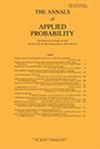Optimal stopping with signatures
IF 1.8
2区 数学
Q2 STATISTICS & PROBABILITY
引用次数: 16
Abstract
We propose a new method for solving optimal stopping problems (such as American option pricing in finance) under minimal assumptions on the underlying stochastic process $X$. We consider classic and randomized stopping times represented by linear and non-linear functionals of the rough path signature $\mathbb{X}^{<\infty}$ associated to $X$, and prove that maximizing over these classes of signature stopping times, in fact, solves the original optimal stopping problem. Using the algebraic properties of the signature, we can then recast the problem as a (deterministic) optimization problem depending only on the (truncated) expected signature $\mathbb{E}\left[ \mathbb{X}^{\le N}_{0,T} \right]$. By applying a deep neural network approach to approximate the non-linear signature functionals, we can efficiently solve the optimal stopping problem numerically. The only assumption on the process $X$ is that it is a continuous (geometric) random rough path. Hence, the theory encompasses processes such as fractional Brownian motion, which fail to be either semi-martingales or Markov processes, and can be used, in particular, for American-type option pricing in fractional models, e.g. on financial or electricity markets.具有签名的最佳停止
我们提出了一种在底层随机过程$X$的最小假设下求解最优停止问题(如金融中的美式期权定价)的新方法。我们考虑由与$X$相关的粗路径签名$\mathbb{X}^{<\infty}$的线性和非线性泛函表示的经典和随机停止时间,并证明在这些签名停止时间类上的最大化实际上解决了原始的最优停止问题。使用签名的代数性质,我们可以将该问题重新定义为一个(确定性)优化问题,仅取决于(截断的)预期签名$\mathbb{E}\left[\mathbb{X}^{\le N}_{0,T}\right]$。通过应用深度神经网络方法来逼近非线性特征泛函,我们可以有效地在数值上解决最优停止问题。关于过程$X$的唯一假设是它是一条连续的(几何的)随机粗糙路径。因此,该理论包括分数布朗运动等过程,这些过程既不是半鞅过程,也不是马尔可夫过程,尤其可以用于分数模型中的美式期权定价,例如在金融或电力市场上。
本文章由计算机程序翻译,如有差异,请以英文原文为准。
求助全文
约1分钟内获得全文
求助全文
来源期刊

Annals of Applied Probability
数学-统计学与概率论
CiteScore
2.70
自引率
5.60%
发文量
108
审稿时长
6-12 weeks
期刊介绍:
The Annals of Applied Probability aims to publish research of the highest quality reflecting the varied facets of contemporary Applied Probability. Primary emphasis is placed on importance and originality.
 求助内容:
求助内容: 应助结果提醒方式:
应助结果提醒方式:


